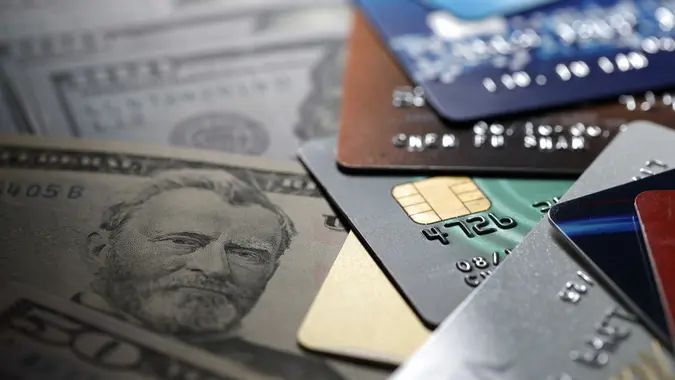What Is a Card Verification Value (CVV) on a Credit Card?

Commitment to Our Readers
GOBankingRates' editorial team is committed to bringing you unbiased reviews and information. We use data-driven methodologies to evaluate financial products and services - our reviews and ratings are not influenced by advertisers. You can read more about our editorial guidelines and our products and services review methodology.

20 Years
Helping You Live Richer

Reviewed
by Experts

Trusted by
Millions of Readers
The Card Verification Value (CVV) number is a unique code printed on your physical credit card used for card verification purposes. For most credit cards, this is a three-digit number printed on the back of the card
Your CVV helps retailers verify that you have physical possession of the credit card you are paying with — whether online or on the phone — and adds an extra layer of security for your account.
Did You Know?
American Express® cards use a four-digit number printed on the front of the card.
Where To Find the CVV on Your Credit Card
You don’t need a special CVV number finder to locate the information you want.
For Discover®, Mastercard and Visa cardholders, the CVV is a three-digit code located in the signature box on the back of the credit card. It often follows the card’s account number.
For American Express cardholders, the CVV lookup process is slightly different. The American Express card identification number — or CVV equivalent — is a four-digit code that can be found above the account number on the front of the credit card.
Why the CVV Matters in Keeping Your Money Safe
The CVV is a credit card security feature that allows online merchants to verify that you have the physical card in your possession. So, even if identity thieves gain access to your credit card number, they won’t be able to make purchases without the CVV.
Additionally, if you’ve used your card at a retailer and they experience a security breach, you won’t need to worry about your CVV number getting compromised. Merchants are prohibited from saving your CVV under the Payment Card Industry Security Standard. They might retain your credit card number, however.
Every credit card is equipped with a unique CVV, but note that the CVV number isn’t synonymous with your personal identification number (PIN).
What Are the Limitations of Using CVV?
Online retailers don’t always require the CVV at checkout, so if someone gets a hold of your credit card number, they can make purchases more easily in those types of situations.
Theft
The credit card CVV is powerless against theft. If you misplace your physical credit card or someone steals it, the identity thief will have your credit card account number, the card expiration date and the CVV at their disposal.
Unauthorized Charges
The CVV number on your credit card helps protect you from fraudulent online charges, however, it’s not an absolute defense. If you see fraudulent charges appear on your card, you should report it immediately and have your card issuer lock the card from further use.
Tips for Keeping Your Credit Card and CVV Safe
Although the CVV number can help keep your information safe, there are other basic security measures that you can take:
- Do your online shopping only at established retailer websites with reliable customer service.
- Report fraudulent activity and lost cards immediately. If you act quickly, your bank can block the credit card account in question before fraudulent charges occur, plus issue a new card for you.
- Review your accounts frequently to find any discrepancies in your purchase history.
- Never share CVV over text, email or phone unless secure
If you’re concerned about fraud, learn how to spot a credit card skimmer.
Final Take: Why Knowing Your CVV Helps Protect You
Your CVV is a three-digit or four-digit number printed on your physical credit card to help protect your account during online and over-the-phone purchases.
It’s important to never share your CVV with anyone, and to avoid saving your CVV online anywhere. If your CVV is compromised, you’ll want to report it immediately and get a new credit card for your account. Your CVV offer extra protection for your credit card and can help protect your account from fraud.
All information about offers has been collected independently by GOBankingRates and has not been reviewed or approved by American Express.
Our in-house research team and on-site financial experts work together to create content that’s accurate, impartial, and up to date. We fact-check every single statistic, quote and fact using trusted primary resources to make sure the information we provide is correct. You can learn more about GOBankingRates’ processes and standards in our editorial policy.
- PCI Security Standards Council. "PCI Security Standards Overview."
- CFPB. "Protect yourself from credit card fraud at the register."
- CFPB. "Am I responsible for unauthorized charges if my credit cards are lost or stolen?"
 Written by
Written by  Edited by
Edited by 

























